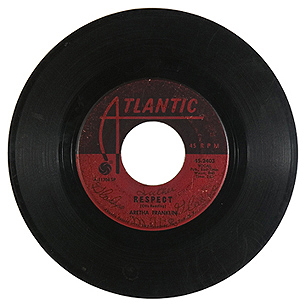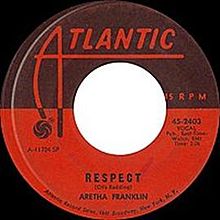| You are not logged in. | login to customize your own personal play list |
“Respect” by Aretha Franklin |
| United States Federal Trade Commission forbids anyone under 13 from viewing these music videos! |
| You are not logged in. | login to customize your own personal play list |
“Respect” by Aretha Franklin |
| United States Federal Trade Commission forbids anyone under 13 from viewing these music videos! |
 |
 |
 |
 |
You need Flash player 8+ and JavaScript enabled to view this video.
|
 |
 |
   |
 |
1967 original cover of Otis Redding’ Respect

1967 original cover of Otis Redding’ Respect
song info
 “Respect” is an R&B song recorded by Aretha Franklin. Originally written and recorded by Otis Redding in 1965, Franklin’s version was her first number one hit and established her as the “Queen of Soul”. Her sister Carolyn came up with the idea for Aretha to spell out the title. The legendary studio musicians at Muscle Shoals, Alabama, added a bridge with the chord changes from Sam and Dave’s “When Something Is Wrong With My Baby”. Song Title: RespectArtist: Aretha Franklin Album: I Never Loved a Man the Way I Love You Genre: R&B Composer: Copyright © 1965 Otis Redding Lead Vocals: Aretha Franklin Backing Vocals: Carolyn and Erma Franklin Rhythm Guitar: Cornell Dupree Keyboards: Dewey Oldham Bass: Tommy Cogbill Drums: Gene Chrisman Saxophone: King Curtis (Curtis Ousley, lead solo), Willie Bridges, Charles Chalmers Producer: Jerry Wexler Recorded: February 14, 1967, Atlantic Studios, New York City, New York Released: April 1967 Label: Atlantic Rolling Stone Top 500: Respect was selected number five (5) in Rolling Stone Magazine’s 500 Greatest Songs of All Time in May 2011. See Rolling Stone. Number of listens: 15590Current rank: 999 (updated weekly) Highest rank: 924 (play the video all the way through to register a vote for this song) Translations courtesy of Apple and Google. |
||

Summary quotation from Wikipedia:
“Respect” is a song written and originally released by Stax recording artist Otis Redding in 1965. “Respect” became a 1967 hit and signature song for R&B singer Aretha Franklin. The music in the two versions is significantly different, and through a few minor changes in the lyrics, the stories told by the songs have a different flavor. Redding’s version is a plea from a desperate man who will give his woman anything she wants. He won’t care if she does him wrong, as long as he gets his due respect when he comes home (“respect” being a euphemism). However, Franklin’s version is a declaration from a strong, confident woman who knows that she has everything her man wants. She never does him wrong, and demands his “respect”. Franklin’s version adds the “R-E-S-P-E-C-T” chorus and the backup singers’ refrain of “Sock it to me, sock it to me, sock it to me…”
Franklin’s cover was a landmark for the feminist movement, and is often considered as one of the best songs of the R&B era, earning her two Grammy Awards in 1968 for “Best Rhythm & Blues Recording” and “Best Rhythm & Blues Solo Vocal Performance, Female”, and was inducted in the Grammy Hall of Fame in 1987. In 2002, the Library of Congress honored Franklin’s version by adding it to the National Recording Registry. It is number five on Rolling Stone’s list of The 500 Greatest Songs of All Time. It was also included in the list of Songs of the Century, by the Recording Industry of America and the National Endowment for the Arts. Franklin included a live recording on the album “Aretha in Paris” (1968).
Recording
Producer Jerry Wexler brought Redding’s song to Franklin’s attention. While Redding’s version was popular among his core R&B audience, Wexler thought the song had potential to be a crossover hit and to demonstrate Franklin’s vocal ability. “Respect” was recorded on February 14, 1967 with Aretha’s sisters, Carolyn and Erma, singing backup.
During the recording of the Franklin version, a bridge was added to Redding’s original composition. Another addition was King Curtis’ tenor saxophone solo and the slicker production of Wexler and co-producer Arif Mardin. The resulting song was featured on Franklin’s 1967 breakthrough Atlantic Records debut album, I Never Loved a Man the Way I Love You. As the title track became a hit on both R&B and pop radio, Atlantic Records arranged for the release of this new version of “Respect” as a single.
Franklin’s rendition found even greater success than the original, spending two weeks atop the Billboard Pop Singles chart, and eight weeks on the Billboard Black Singles chart. It also became a hit internationally, reaching number ten in the United Kingdom, and helping to transform Franklin from a domestic star into an international one. Even Otis Redding himself was impressed with the performance of the song. At the Monterey Pop Festival in the summer of the cover’s release, he was quoted playfully describing “Respect” as the song “that little girl done stole from me”.
Lyrics
Franklin’s version of the song contains the famous lines (as printed in the lyrics included in the 1985 compilation album Atlantic Soul Classics):R-E-S-P-E-C-TThe last line is often misquoted as “Take out, TCP”, or something similar, and indeed most published music sheets which include the lyrics have this incorrect line in them. “R-E-S-P-E-C-T” and “T-C-B” are not present in Redding’s original song, but were included in some of his later performances with the Bar-Kays. There seems to be some confusion over who first used “T-C-B” in the song.
Find out what it means to me
R-E-S-P-E-C-T
Take care … TCB
“TCB” is an abbreviation, that was commonly used in the 1960s and 1970s, meaning “Taking Care (of) Business”, and it was particularly widely used in African-American culture. However, it was somewhat less well-known outside of that culture, yielding a possible explanation as to why it was not recognized by those, who transcribed Franklin’s words for music sheets. Nevertheless, “TCB in a flash” later became Elvis Presley’s motto and signature, from his necklace to his private jet plane.
Franklin’s lyrics most probably influenced hip-hop’s later use of both the word “proper” and “props” in the context of proper respect. She proclaims, that she’s about to give him all her money, and that all she’s asking is for him to give her “her propers”, when he gets home.
Legacy
“Respect” has appeared in dozens of films and still receives consistent play on oldies radio stations. In the 1970s, Franklin’s version of the song came to exemplify the feminist movement. Producer Wexler said in a Rolling Stone interview, that Franklin’s song was “global in its influence, with overtones of the civil-rights movement and gender equality. It was an appeal for dignity.” Although she had numerous hits after “Respect”, and several before its release, the song became Franklin’s signature song and her best-known recording. I Never Loved a Man the Way I Love You was ranked eighty-third in Rolling Stone’s 500 Greatest Albums of All Time in 2003. A year later, “Respect” was fifth in the magazine’s 500 Greatest Songs of All Time.The song “Respect” is part of the The Rock and Roll Hall of Fame’s 500 Songs that Shaped Rock and Roll list.
—from Wikipedia (the Wikipedia:Text of Creative Commons Attribution-ShareAlike 3.0 Unported License applies to Wikipedia’s block of text and possible accompanying picture, along with any alterations, transformations, and/or building upon Wikipedia’s original text that ThisSideofSanity.com applied to this block of text)
The Americans with Disabilities Act (ADA) and U.S. Government Section 508 of the Rehabilitation Act of 1973 require that web sites provide transcripts of audio for the deaf.
We will be adding lyrics to all songs as fast as we can. Please be patient.
Gabriella: Eu amo esta canção.
To submit a comment, use the form below:
Please use the form (with the delay for a human to inspect it) because this website is attacked by more than 20 spam attempts per minute. The only way to keep you safe from the spam is by having human review.
 |
  |
|
If you spot an error in fact, grammar, syntax, or spelling, or a broken link, or have additional information, commentary, or constructive criticism, please contact us.
Copyright © 2014 Milo. All rights reserved. Todos Derechos Reservados. The copyrights on all source code and the data base belong to Milo and are used on this web site by permission.
The source code is at OSdata.com, released under Apache License 2.0.
Copyright 2012, 2013, 2014 Milo
Licensed under the Apache License, Version 2.0 (the “License”); you may not use this file except in compliance with the License. You may obtain a copy of the License at:
http://www.apache.org/licenses/LICENSE-2.0
Unless required by applicable law or agreed to in writing, software distributed under the License is distributed on an “AS IS” BASIS, WITHOUT WARRANTIES OR CONDITIONS OF ANY KIND, either express or implied. See the License for the specific language governing permissions and limitations under the License.
Enjoy the This Side of Sanity website Twitter feed.
Enjoy the This Side of Sanity Twitter feed.

|
player artwork by michaelm